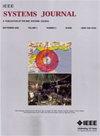基于近似MMSE稀疏检测器的带符号正交空间调制低复杂度检测框架
IF 4.4
3区 计算机科学
Q1 COMPUTER SCIENCE, INFORMATION SYSTEMS
引用次数: 0
摘要
大规模多输入多输出(mMIMO)系统的低复杂度数据检测技术的设计一直吸引着工业界和研究人员的关注,因为迫切需要在复杂性和性能之间实现适当的权衡,特别是对于签名正交空间调制(SQSM)方案。然而,在mimo系统中,SQSM方案具有较高的频谱效率和良好的性能,但其计算复杂度较高。在本文中,我们为SQSM方案提出了一个高效的低复杂度检测框架。本文通过解耦实向量流和虚向量流的检测,将稀疏性检测与最小均方误差(MMSE)检测相结合。不幸的是,基于mmse的检测器具有矩阵反演,这导致了很高的计算复杂度。因此,我们采用了几种迭代方法;即共轭梯度和Gauss-Seidel,避免了精确的矩阵反演,从而大大降低了计算复杂度。此外,该框架还可以支持其他迭代方法,如JA、连续过松弛、加速过松弛、诺伊曼级数、牛顿迭代、双参数过松弛和理查德森方法。提出的检测框架实现了显著的复杂性降低,性能下降很小或不显著。本文章由计算机程序翻译,如有差异,请以英文原文为准。
A Low-Complexity Detection Framework for Signed Quadrature Spatial Modulation Based on Approximated MMSE Sparse Detectors
The design of low-complexity data detection techniques for massive multiple-input multiple-output (mMIMO) systems continues to attract considerable industry and research attention due to the critical need to achieve the right tradeoff between complexity and performance, especially with the signed quadrature spatial modulation (SQSM) scheme. However, the SQSM scheme attains a high spectral efficiency and good performance but suffers from a high computational complexity with mMIMO systems. In this article, we propose an efficient low-complexity detection framework for the SQSM scheme. Sparsity detection is amalgamated in this article with minimum mean-square error (MMSE) detector by decoupling the detection of the real and imaginary vector streams. Unfortunately, the MMSE-based detector has a matrix inversion which incurs a high computational complexity. Therefore, we employed several iterative methods; i.e., conjugate gradient and Gauss–Seidel, to avoid the exact matrix inversion, and hence, the computational complexity is significantly reduced. Moreover, the proposed framework can host other iterative methods such as the JA, successive over relaxation, accelerated over relaxation, Neumann series, Newton iteration, two-parameter over relaxation, and Richardson methods. The proposed detection framework attains a significant complexity reduction with a small or insignificant deterioration in the performance.
求助全文
通过发布文献求助,成功后即可免费获取论文全文。
去求助
来源期刊

IEEE Systems Journal
工程技术-电信学
CiteScore
9.80
自引率
6.80%
发文量
572
审稿时长
4.9 months
期刊介绍:
This publication provides a systems-level, focused forum for application-oriented manuscripts that address complex systems and system-of-systems of national and global significance. It intends to encourage and facilitate cooperation and interaction among IEEE Societies with systems-level and systems engineering interest, and to attract non-IEEE contributors and readers from around the globe. Our IEEE Systems Council job is to address issues in new ways that are not solvable in the domains of the existing IEEE or other societies or global organizations. These problems do not fit within traditional hierarchical boundaries. For example, disaster response such as that triggered by Hurricane Katrina, tsunamis, or current volcanic eruptions is not solvable by pure engineering solutions. We need to think about changing and enlarging the paradigm to include systems issues.
 求助内容:
求助内容: 应助结果提醒方式:
应助结果提醒方式:


